| Category | Assignment | Subject | Management |
|---|---|---|---|
| University | Leeds Beckett University | Module Title | Operations and Supply Chain Management [OSCM] |
| Word Count | 2500 words |
|---|---|
| Academic Year | H5 Semester 2 2024-25 |
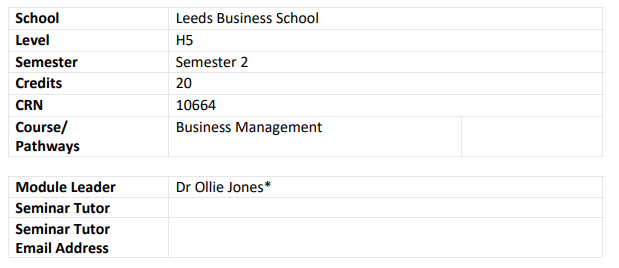
This module is about developing your ability to examine complex businesses and organisations to determine how a business’s operations and its supply chain improves performance for customers. Operations Management is a major part of how businesses actually create value for customers, and hence produce competitive advantage. Almost all graduates will work in an operation of some kind in their first role, and those that don’t will need to understand the concepts because they exhibit inter-dependence with other organisational functions, such as marketing and HR, finance etc.
By using a range of real-life scenarios both qualitative and quantitative data in different media you will (!) learn to first comprehend, then apply and analyse, concepts and principles from the field of operations and supply chain management. The Assessment takes the form of a multi-media simulation constructed using a real-life client organisation, in which you have to navigate and analyse, and make recommendations for improvement using the tools and techniques you have learnt. The assessment is an individual and independent piece of work
The teaching team have all been practitioners in operations management, are passionate about the subject, and want to inspire you to both learn and do as well as you can in the assessment process. We have developed and refined our assessment method over the last 15 years, and the real-life business element adds to both the realism and authenticity, and more importantly develops and enhances your employability skills.
All the tutors have published a profile of themselves, their background, and expertise in MyBeckett. The best place to access their help is in the seminar class, we always allow some time in the sessions for you to ask questions, particularly about the assessment.
To enable students to comprehend, and selectively apply operations and supply chain management ideas to complex organisations in different sectors providing both goods and services. This is in order to assess and improve business performance and competitive position.
The module is based on an operational model from the core textbook.
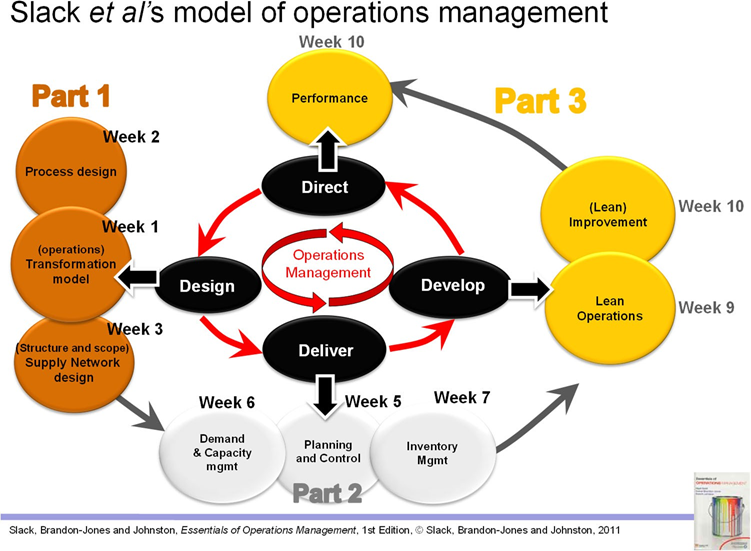
The module is split into three parts, each relating to a separate component of assessment.
We use just three integrated recurring teaching cases, one each part to help you develop your understanding, and contain focus on application of concepts, rather than case context.
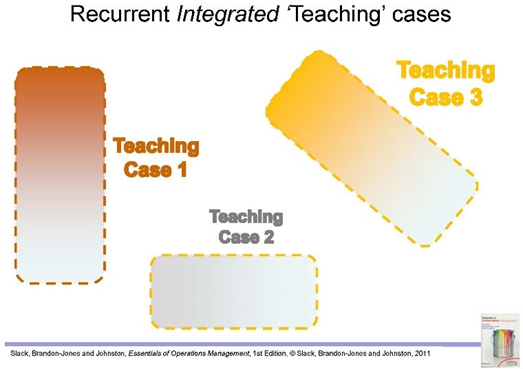
The resulting weekly schedule for each week is contained in mybeckett, and summarised later in this handbook
The teaching is all on campus but the module has some additional support elements of blended learning. All the online learning activities we utilise were employed before the pandemic, we have experience and a strong foundation for supporting blended learning.
Some of the terminology in learning at level 5 might be new and will be different in various modules We are aiming to create a consistent, coherent set of terms for this module, so use the following as a reference point – this is also in mybeckett.
The activities split into those which are interactive – involve communication between tutors and students, and those resources which you can use independently.
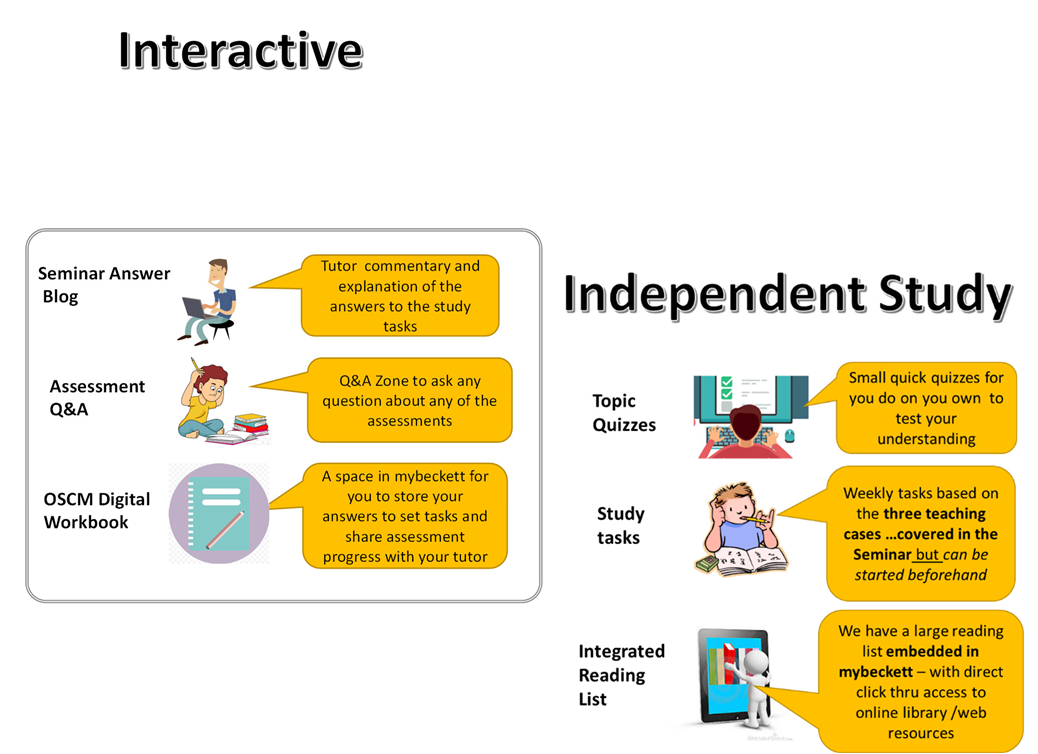
Are You Looking for Answer of This Question
Order Non Plagiarized AssignmentThe lectures are on campus and are configured around the different parts of the assessment. These are NOT
recorded as the Lectures are designed to be interactive and will contain live quizzes, demonstrations, videos, games etc, so attendance is beneficial. However, We will provide smaller ‘bite size’ video extracts from the lecture which are hosted in YouTube and released in the relevant week.
The module team’s philosophy of learning about this subject is concerned with action learning, i.e. learning from doing, solving real-life problems using the theory we are trying to teach you!
It is about applying a range of concepts to business operations to solve problems, to evaluate situations and to make recommendations for improvements.
We use the three teaching cases to provide simulations of real-life scenarios in operations management, which a graduate would be doing as part of their job. The seminars therefore consist of study tasks which require you to DO SOMETHING! … but get help and feedback to support your work in the session, typically in small groups.
The study questions and teaching cases are in MyBeckett in the weekly theme content areas so you can start looking at them before the seminar if you wish or find the subject difficult. The diagram below shows how a typical seminar (tutorial) for this module.
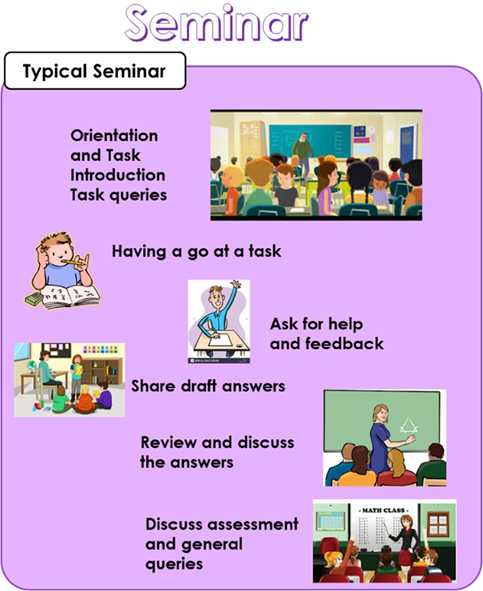
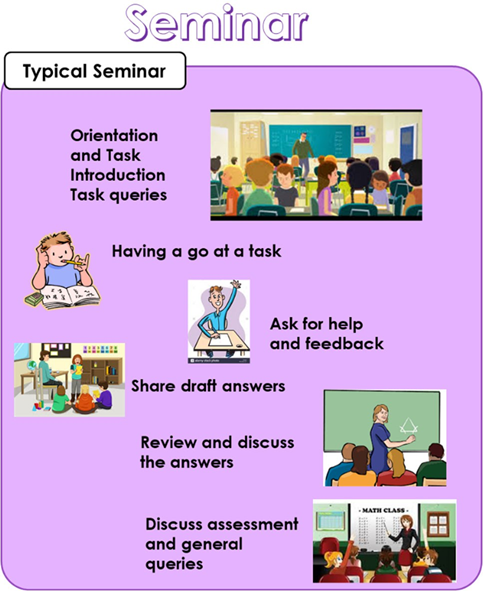
All the study tasks are designed to be equivalent to the assessment. This means we will be asking you to do a similar task for the component assessments, but based on the assessment case, not the teaching case. Therefore, the seminar ends with a discussion about how this applies to the assessment task, and your opportunity to ask questions about this.
After the seminar you should then read the answer blog, (in MyBeckett) which is a short summary written by the module team about the task and the key learning points, including the indicative answers. The blog can serve as a useful reminder when it comes to undertaking
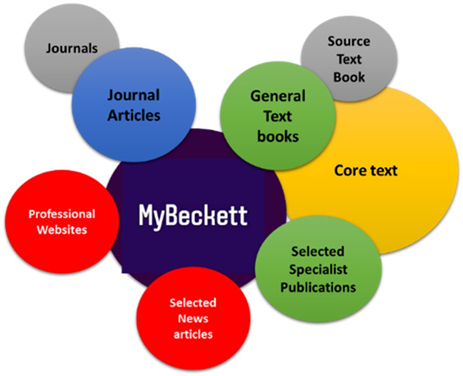
The diagram illustrates the main types of learning resources available. At the core of these is the MyBeckett site which contains specific tailored specific resources for the module including copies of the lecture slides, videos of lecture content, tutorial cases and questions etc.
Core textbook
The second most significant resource is the core textbook. This has been customised for us with the core (what we actually teach) of one of the best Operations Management books. The publishers offer this book at a significant (!) discount to the standard text, because of the focused content, and because it is printed
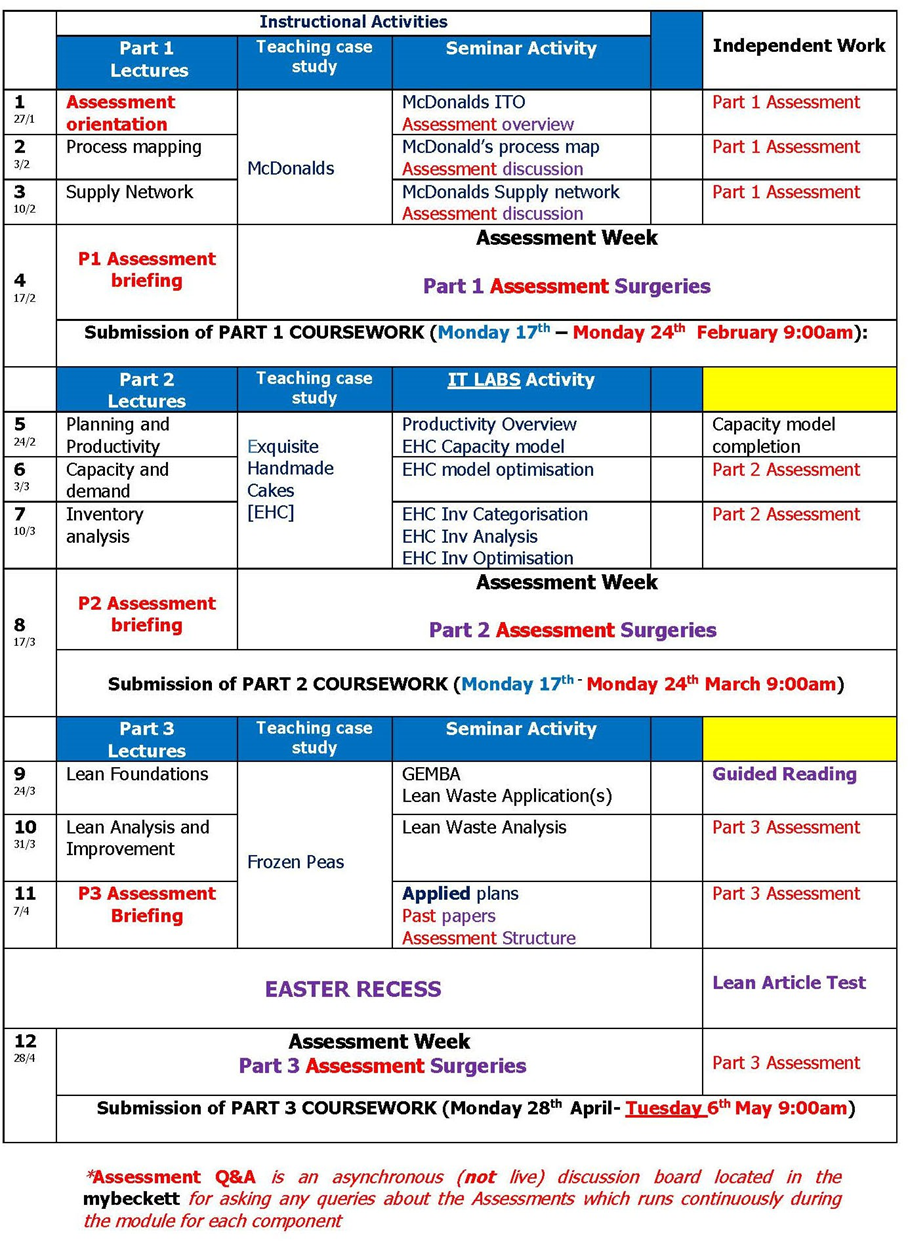
Achieve Higher Grades This Assignment
Order Non Plagiarized AssignmentThe assessment is set in a real-life business, based in the region. The module team have constructed a multi- media simulation based on this business and we will set tasks about operations management issues in this company to be completed within the semester.
We use this multi-media simulation for a number of reasons.
• It simulates the complexity of an operation better than pure text.
• It is challenging and more interesting than a text case.
• It develops employability skills and reflects the practical real-life experience of a graduate.
You need to treat accessing the simulation similar to working in the business, in that you should make notes as you watch, listen and read the different sets of data. Not everything is relevant, and part of the task is to gather, sift and collate information from the range of data. In addition, not everything is clear, as it would be in a real visit, and not every scrap of conversation is crucial. Sometimes you may get conflicting or incomplete information in which case you may have to make some value judgements or assumptions based on the available data.
The information contained in the simulation is comprehensive, so there is no need to try and contact the business direct. Anyone who attempts to contact the business or distribute case material will incur severe MARK penalties. This could affect their productivity, damage our agreement with the business, and affect the University’s standing in the business community. The simulation, the questions and submission point are ONLY available in MyBeckett.
The assignment will require you to replicate successfully, to a degree, (in a different context) the application of theory similar to that in the tutorials. The assessment is split into three components, referred to as PARTS 1, 2 and 3. Part of the rationale for splitting the assessment within the semester so you can immerse yourself in the simulation and start to understand it as early as possible.
The assessment design of the simulation and the ongoing assignment tasks are set within designated assessment weeks, where you have both the flexibility of when to submit, and to take advantage of the support offered within those weeks in the form of formative feedback on your work by your tutor. The definitive, detailed assignment brief is laid out later in the handbook, however, below is an outline of the simulation tasks.
PART 1 of assessment is about mapping, categorising and clarifying the business’s operations and supply chain, and takes the form of a set of diagrams.
PART 2 requires you to use MS Excel to construct or analyse data sets from an operation to provide insight into how to manage an element of an operation. The actual excel sheet must be submitted as the assessment.
PART 3 is about using relevant theory to evaluate and improve operational performance and consists of an analysis report on the operation written for the company director(s) with an element that is customised for your course pathway. See the details later in the handbook for your particular pathway assessment.
Parts 1, 2 and 3 are component assessments, but are three sections of the same overall dossier set on the multi- media simulation. You have to submit all the components in order to achieve a pass in the module. Your overall mark will be a composite of all components according to the weighting identified. Any late submission penalties will be allocated to each section before compiling the overall mark.
|
Assessment Method: Foundation Diagrams |
|
|
Word Count |
Not applicable |
|
Assessment Date and Time: |
Monday 17th – Monday 24th Feb 9:00am |
|
Feedback Method: |
Scored Rubric and Comments in Grademark (Turnitin) |
|
Feedback Date: |
4 weeks from Submission |
|
|
|
|
Learning Outcomes Assessed: (1) (2) |
|
|
Assessment Method: Excel Analysis Workbook |
|
|
Word Count |
500 words in a text box embedded in the Excel sheet |
|
Assessment Date and Time: |
Monday 17th - Monday 24th March 9:00am |
|
Feedback Method: |
Comments in Blackboard Assignment function |
|
Feedback Date: |
4 weeks from Submission |
|
|
|
|
Learning Outcomes Assessed: (1) (2) |
|
|
Assessment Method: |
Operations Analysis Report |
|
Word Count |
2500 (Words in diagrams not included, but tables are; bibliography and executive summary not in word count) |
|
Assessment Date and Time: |
Monday 28th April- Tuesday 6th May 9:00am |
|
Feedback Method: |
Scored Rubric and Comments in Grademark (Turnitin) |
|
Feedback Date: |
4 weeks from Submission |
|
|
|
|
Learning Outcomes Assessed: (1), (3) (4) |
|
Re-assessment Method: For all Parts 1, 2 and 3
This is an exact repeat of the original assessment for students to ‘make good’ on their work.
The flexible deadline submission for resits will occur from 8th -15th July
Students only have to be re-assessed if they do not submit a component, or if they fail the module overall < 40. In this case they only resubmit the component(s) they failed.
Based on the Multi-Media simulation; for the SKOPOS business, contained in the MyBeckett site for Operations and Supply Chain Management. All students must answer each Part 1, 2 and 3
|
Mark |
|
Question/Tasks |
% of module Mark |
|
|
.30% |
.PART 1 .Ops Foundation .maps |
· .Construct an ITO for the SKOPOS business. · Map the process for order fulfilment starting at enquiry followed by estimating, manufacture and including installation of the fitted curtain products by Skopos. · .Construct an upstream and downstream supply network diagram for SKOPOS |
.9% .15%
.6% |
|
|
.20% |
.PART 2
.Excel Analysis File |
.Choose one question from below |
.10%
.10% |
|
|
.Produce a capacity and demand model and scenario plans for SKOPOS curtain manufacturing resources. .Include an outline of your conclusions and recommendations based on your analysis. |
.Conduct a thorough Inventory analysis of SKOPOS raw material stock. .Include an outline of your conclusions and based on these, devise a revised inventory plan. |
|||
|
.Approximately half of the marks for part 2 are for the calculations/model – the other half are for relating to the case context. .Students must submit their Excel file separately in MyBeckett for PART 2. |
||||
|
.50% |
.PART 3
.Operations Analysis Report |
.All Students must answer the two sub-questions. This is a consultant-style business report to the Managing Director, and question (b) is your structured conclusion to them. |
.40%
.10% |
|
|
.a) Conduct a Lean investigation of SKOPOS and utilising this construct some applied plans to make the business ‘leaner’ .b) Identify how your Lean Improvement plans could improve SKOPOS operational performance in their competitive context. |
||||
|
.Remember you can utilise your work from Part 1 and 2. .You MUST apply RELEVANT theory to answer the question |
||||
|
PART 1 |
Is in the form of a diagrammatic dossier (in one FILE) using relevant concepts and diagrams as specified in the questions/ We recommend this is converted to a PDF before submission to a TURNITIN submission area in mybeckett. |
|
PART 2 |
Must be constructed with, (or converted to) an Excel spreadsheet, and submitted to MyBeckett assignment box as one FILE as instructed. The Excel file should contain a sheet (tab) outlining any assumptions, operational implications and conclusions from your model or analysis, ideally within a text box of less than 500 words. This is akin to an email to written to the financial director. |
|
PART 3 |
Should be in the form of a business report of 2500 words with appropriate structure and layout and presentation using pictures, photos, tables, diagrams, graphs and references as required. You can refer to your PART 1 and 2 answers in PART 3, and cite them if required, but DO NOT SUBMIT AN APPENDIX – this will not be marked – all relevant supporting items should be within the body of the report. Lean investigations should include a GEMBA application of waste and subsequent analysis of the main effects and causes. As this is a live consultant report for submission to the company director(s), no introduction to the business is required, but you should include an executive summary and a contents page, neither of which is included in your word count. Question (b) is your structured conclusion so no additional conclusion is needed. All sources in Part 3 must be both cited and referenced using Harvard Referencing. We recommend your work is converted to a PDF prior to submission to a TURNITIN submission area in mybeckett. |
Buy Answer of This Assignment & Raise Your Grades
Order Non Plagiarized AssignmentStruggling with your Operations and Supply Chain Management [OSCM] Assignment? Get expert guidance from our Online Supply Chain Management Writers and achieve academic excellence with ease. Our platform offers reliable online assignment help, tailored specifically to meet the requirements of uk university students. Need inspiration? Explore our free assignment example samples to understand how to approach your topics effectively. All content is AI-free and 100% human-written, ensuring originality and high quality. Whether you’re preparing for your next submission or just starting out, our resources are designed to support your learning journey. Let us help you succeed with confidence today!
Hire Assignment Helper Today!
Let's Book Your Work with Our Expert and Get High-Quality Content
